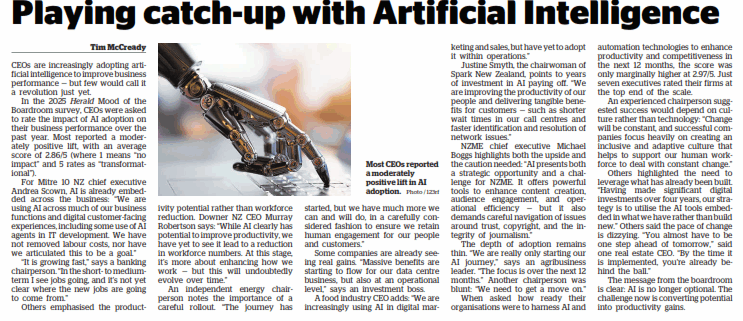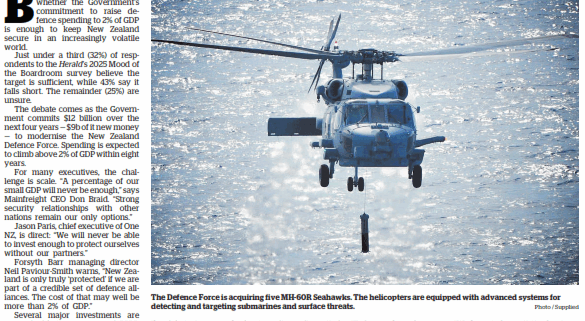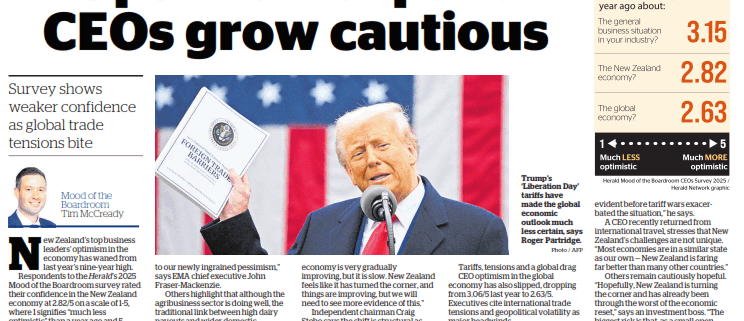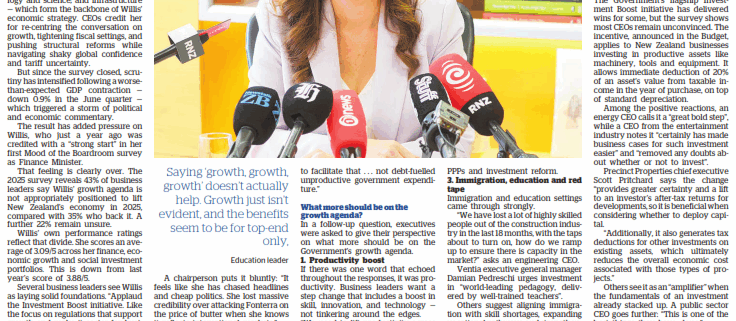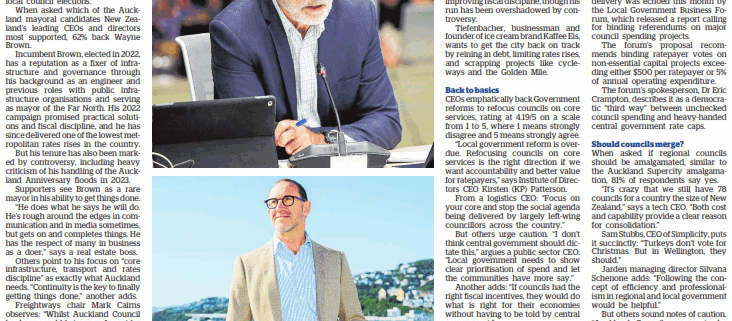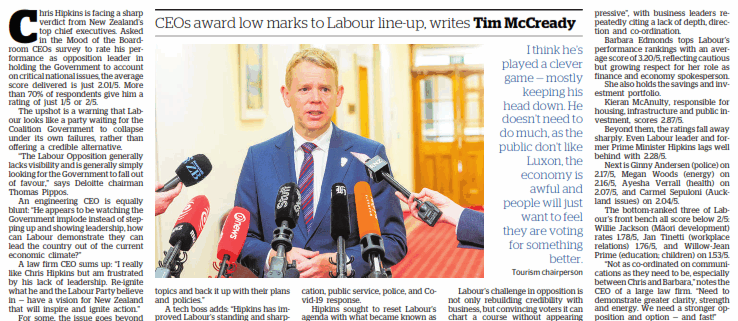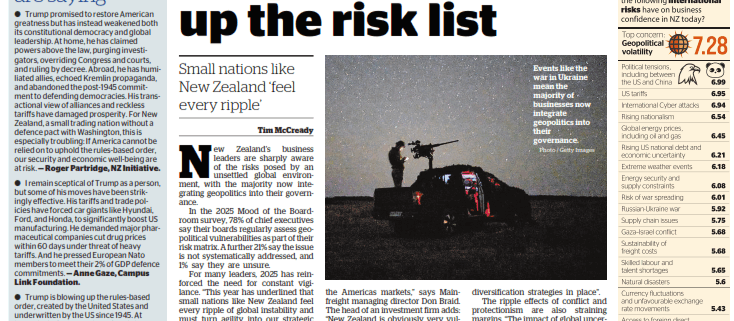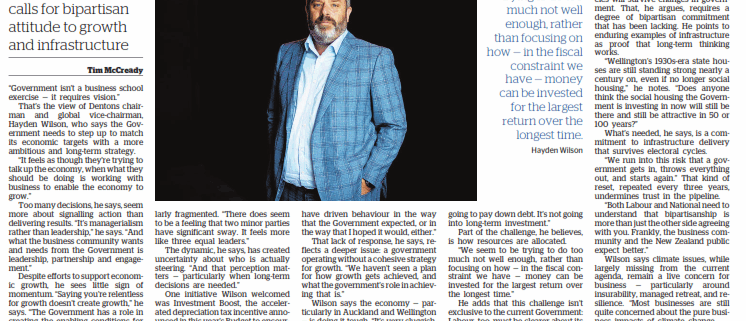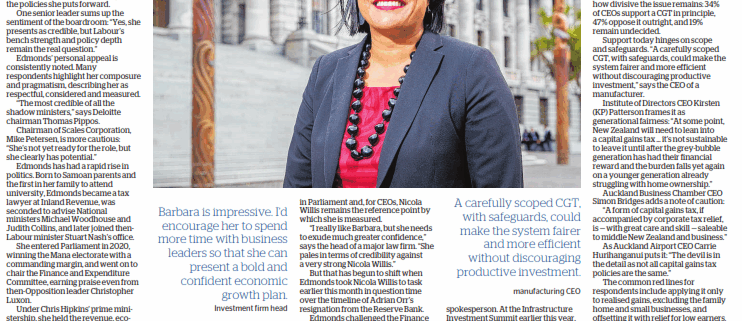Mood of the Boardroom: Mood shift on Willis’ growth push (NZ Herald)
CEOs have sent a clear message to Finance Minister Nicola Willis in the Herald’s Mood of the Boardroom survey: hold the pro-growth line, sharpen delivery, and set out a long-term vision that brings investors back onside.
At the centre of the Government’s “Going for Growth” agenda are five pillars — developing talent; competitive business settings; global trade and investment; innovation, technology and science; and infrastructure — which form the backbone of Willis’ economic strategy. CEOs credit her for re-centring the conversation on growth, tightening fiscal settings, and pushing structural reforms while navigating shaky global confidence and tariff uncertainty.
But since the survey closed, scrutiny has intensified following a worse-than-expected GDP contraction — down 0.9% in the June quarter — which triggered a storm of political and economic commentary.
The result has added pressure on Willis, who just a year ago was credited with a “strong start” in her first Mood of the Boardroom survey as Finance Minister.
That feeling is clearly over. The 2025 survey reveals 43% of business leaders say Willis’ growth agenda is not appropriately positioned to lift New Zealand’s economy in 2025, compared with 35% who back it. A further 22% remain unsure.
Willis’ own performance ratings reflect that divide. She scores an average of 3.09/5 across her finance, economic growth and social investment portfolios.
This is down from last year’s score of 3.88/5.
Several business leaders see Willis as laying solid foundations. “Applaud the Investment Boost initiative. Like the focus on regulations that support growth and make it easier for business to focus on executing their commercial plans,” says EMA CEO John Fraser-Mackenzie.
Others highlight her direction.
A public sector CEO says: “The five pillars of the economic plan are good and right,” though warns the lack of intervention and focus on retail politics is undermining the impact.
Roger Partridge, chair of The New Zealand Initiative, gives “real credit for putting growth at the centre of the agenda and for championing reforms in education, housing, regulation and infrastructure that target New Zealand’s long-term productivity malaise”. A tech CEO adds: “The Willis growth agenda has some pro-growth pillars in the right place — tight fiscal settings, a clearer safe harbour pitch to attract capital, visa and FDI tweaks, and a faster planning and consent track.”
But optimism is tempered by scepticism over substance and delivery. “Sorry, what ‘growth agenda’?” asks one. “Willis’ so-called growth agenda is spin without substance. She excels at bashing business for non-issues like butter prices, but has not shown any genuine thought leadership.”
A chairperson puts it bluntly: “It feels like she has chased headlines and cheap politics. She lost massive credibility over attacking Fonterra on the price of butter when she knows it reflects international markets.”
Those critiques intensified after the GDP release and public calls from some commentators for Willis to step aside — calls rebuffed by the Beehive.
Some respondents acknowledge the constraints. “New Zealand’s debt levels, structural deficits and voter apathy for dealing with any of these means all finance ministers are in straitjackets,” says an energy CEO.
But others are less forgiving. “What has she done to create growth in New Zealand?
“I can’t think of a single thing other than the supermarkets/banking publicity, which so far has not achieved anything,” says an infrastructure boss. “New Zealand is in a growth funk and, if this is her responsibility, then she has not delivered.”
An education leader suggests “saying ‘growth, growth, growth’ doesn’t actually help. Growth just isn’t evident, and the benefits seem to be for top-end only.”
Craig Stobo, chairman of the Local Government Funding Agency, says the opportunity remains to spell out the sources of sustainable growth: “Real after-tax incomes, profitable investment and net exports and how to facilitate that … not debt-fuelled unproductive government expenditure.”
What more should be on the growth agenda?
In a follow-up question, executives were asked to give their perspective on what more should be on the Government’s growth agenda.
1. Productivity boost
If there was one word that echoed throughout the responses, it was productivity. Business leaders want a step change that includes a boost in skill, innovation, and technology — not tinkering around the edges.
“We need to lift productivity across the board — and that means retraining and reorienting our workforce, especially those at the lower end of the wage spectrum,” says an engineering CEO.
Respondents also point to reform of tax and regulatory settings to attract capital, accelerate R&D, and grow high-value sectors, alongside investment in digital transformation and AI adoption.
2. Infrastructure at scale
The second most pressing call was for major infrastructure investment, with delivery needed, not just more announcements.
“We need an infrastructure pipeline and certainty — including energy investment,” says Deloitte CEO Mike Horne. Another CEO adds: “We’ve lost too much time. It’s time to accelerate, not deliberate.”
With construction output weakening, leaders want shovel-worthy projects ready as financing costs ease. Suggestions range from a bankable housing and transport pipeline with credible delivery; to unlocking the infrastructure deficit in transport, energy, and housing; and mobilising private and foreign capital through PPPs and investment reform.
3. Immigration, education and red tape
Immigration and education settings came through strongly.
“We have lost a lot of highly skilled people out of the construction industry in the last 18 months, with the taps about to turn on, how do we ramp up to ensure there is capacity in the market?” asks an engineering CEO.
Ventia executive general manager Damian Pedreschi urges investment in “world-leading pedagogy, delivered by well-trained teachers”.
Others suggest aligning immigration with skill shortages, expanding vocational pathways, and strengthening universities’ role in innovation.
Red tape remains a major frustration. “We have become a nation that is full of overly conservative regulation and red tape, so much so, particularly in infrastructure and development, that we are uncompetitive with our peer nations.”
Mainfreight managing director Don Braid is direct: “Reduce the regulation. Get out of the way.”
4. A compelling vision
Respondents call for a clear and ambitious national vision that stretches beyond a three-year election cycle.
Foodstuffs North Island CEO Chris Quin was among those urging the Government to adopt stronger long-term thinking. “We need a stronger long-term vision that enables clear planning for infrastructure, economic direction, and achievable national goals with broad cross-party support.”
He points out that other countries are already planning decades ahead and reaping the benefits.
An infrastructure CEO: “Are we content to coast on lucky high-priced agricultural exports, or do we want to set a bold agenda in tech, tourism, and advanced manufacturing?”
The CEO of an energy firm urges the Government to “deliver a coherent vision and strategy to give New Zealanders something to get excited and committed to”.
Several directors link the vision point to investor confidence, arguing clearer long-term signals would help reverse a “wait-and-see” mindset after growth disappointments.
Investment Boost uptake is muted
The Government’s flagship Investment Boost initiative has delivered wins for some, but the survey shows most CEOs remain unconvinced. The incentive, announced in the Budget, applies to New Zealand businesses investing in productive assets like machinery, tools and equipment. It allows immediate deduction of 20% of an asset’s value from taxable income in the year of purchase, on top of standard depreciation.
Among the positive reactions, an energy CEO calls it a “great bold step”, while a CEO from the entertainment industry notes it “certainly has made business cases for such investment easier” and “removed any doubts about whether or not to invest”.
Precinct Properties chief executive Scott Pritchard says the change “provides greater certainty and a lift to an investor’s after-tax returns for developments, so it is beneficial when considering whether to deploy capital.
“Additionally, it also generates tax deductions for other investments on existing assets, which ultimately reduces the overall economic cost associated with those types of projects.”
Others see it as an “amplifier” when the fundamentals of an investment already stacked up. A public sector CEO goes further: “This is one of the best things they have done.”
But uptake is muted. Nearly half (48%) say it has not influenced their investment decisions at all, with another 25% reporting it only had a marginal effect. Just 9% credit it with significantly shaping their decisions, leaving the initiative with a weighted average score of 1.88/5 for encouraging increased investment.
The prevailing sentiment is scepticism. A tourism chairperson dismisses it, saying: “It hasn’t made any difference to making sensible business decisions.”
Dairy Holdings’ chairman Greg Gent says that over the life of an asset, the scheme represents just “a 6% saving, so commercially it makes no sense to chase it.”
Several CEOs say they have “no money left to invest”, while others describe the scheme as “not really relevant” to their business.
More scathing was one CEO, who argued the policy was “one of the most overhyped” in memory: “No serious business makes million-dollar investment decisions because IRD is feeling generous on depreciation tables … the economy needs genuine structural reform and certainty.”

